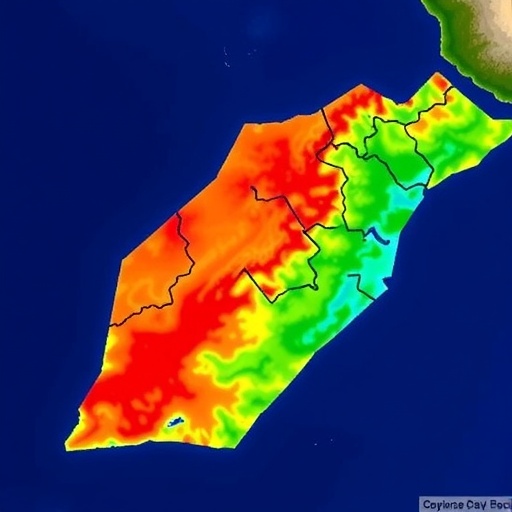In a groundbreaking study, researchers have delved into the complex issue of carbon dioxide emissions in Morocco, employing a novel approach that combines ridge regression with meticulous data preprocessing techniques and a comprehensive analysis of feature impacts. As nations grapple with the pressing challenge of climate change, understanding and accurately predicting CO2 emissions has never been more critical. The research conducted by Y. Dani, N. Belouaggadia, and M. Jammoukh sheds light on how mathematical modeling and data analysis can provide invaluable insights into emissions trends and the effectiveness of various interventions.
At the core of the study is the use of ridge regression, a statistical method particularly suited for situations where multicollinearity exists among the predictor variables. In the realm of environmental science, predictor variables can often be interrelated, making it difficult to discern individual impacts on CO2 emissions. By applying ridge regression, the researchers managed to mitigate the effects of multicollinearity, allowing for clearer interpretations of how different factors contribute to the emissions landscape in Morocco.
This research is not only an academic exercise; it is grounded in real-world data and pressing environmental needs. Morocco, like many countries, faces the dual challenge of fostering economic development while simultaneously addressing its carbon footprint. The interplay between these two imperatives underscores the importance of predictive modeling in crafting effective policy measures. The study importantly highlights that robust models are essential tools for policymakers to prioritize investments and enhance their decision-making processes regarding sustainable development.
Data preprocessing was another significant aspect of this study. The researchers meticulously cleaned and organized a vast data set that encompassed various metrics, including energy consumption, economic growth indicators, and demographic statistics. The importance of data quality cannot be overstated; accurate predictions are only possible when the underlying data is reliable and well-structured. This foundational step ensured that the subsequent analysis was based on a sound footing, enabling the researchers to derive meaningful and actionable insights from their models.
Once the data was preprocessed, the team moved on to the application of ridge regression. This technique provided a framework to assess multiple variables simultaneously and understand their cumulative impact on CO2 emissions. The model produced results that revealed not just the magnitude of each factor’s influence but also their interactions. This level of analysis is crucial for policymakers who need to understand the multifaceted nature of emissions in order to design effective interventions.
In exploring feature impact, the research unveiled surprising findings about which factors played the most significant roles in influencing CO2 emissions. Economic growth, energy consumption patterns, and even social factors were all examined. Policymakers armed with this kind of information can better comprehend how various initiatives might mitigate emissions while balancing economic interests. Notably, the findings from this study could serve as a template for similar analyses in other countries facing comparable challenges.
The implications of this research extend beyond Morocco. As countries around the globe fight to meet international climate goals, the analytical techniques developed in this study can be adapted to various contexts, thus enhancing global understanding of CO2 emissions trends. Ridge regression, coupled with robust data preprocessing and feature analysis, may become a standard operating procedure for environmental assessments worldwide, shaping how nations approach their emissions strategies.
Furthermore, the study emphasizes the critical role of interdisciplinary collaboration. Bringing together experts in environmental science, data analytics, and public policy is essential for addressing the multifaceted consequences of carbon emissions. The researchers advocate for a collaborative approach where different disciplines converge to develop comprehensive strategies aimed at emissions reduction. This approach not only enriches the research but also bridges the gap between scientific theory and practical application.
In conclusion, Y. Dani, N. Belouaggadia, and M. Jammoukh’s study represents a significant contribution to the growing body of work focused on predictive analytics in environmental science. Their application of ridge regression along with diligent data preprocessing and feature impact analysis unveils promising strategies for understanding and addressing CO2 emissions in Morocco. As the world strives to combat climate change, such research will be invaluable for shaping future environmental policies and informing sustainable practices.
This study is an affirmation of the critical intersection between data science and climate action, showing how technology can empower nations as they look for solutions to climate change. By leveraging advanced statistical methodologies, the research outlines clear pathways for effective interventions in emissions reduction. As policymakers reflect on these findings, the imperative to integrate data-driven approaches into environmental strategy has never been clearer.
The findings offer a blueprint for expanding such analyses to other regions, suggesting that a similar approach could lead to customized strategies geared towards reducing the carbon footprints of different nations. As the conversation around climate change takes center stage globally, this research serves as a clarion call for data-informed decision-making in crafting a sustainable, economically viable future.
In essence, this research not only enlightens our understanding of Morocco’s emissions but also exemplifies the wider potential of statistical modeling in environmental management. This underscores a profound truth: the path to sustainability must be paved with robust data analysis and unrelenting innovation. As we continue to confront the climate crisis, studies like these illuminate the way forward, ensuring that we are equipped with the tools necessary to make informed decisions for our planet’s future.
Subject of Research:
Article Title: Predicting CO2 emissions in Morocco: exploring the use of ridge regression with data preprocessing and feature impact analysis.
Article References:
Dani, Y., Belouaggadia, N. & Jammoukh, M. Predicting CO2 emissions in Morocco: exploring the use of ridge regression with data preprocessing and feature impact analysis.
Environ Sci Pollut Res (2025). https://doi.org/10.1007/s11356-025-37156-y
Image Credits: AI Generated
DOI: https://doi.org/10.1007/s11356-025-37156-y
Keywords: CO2 emissions, ridge regression, data preprocessing, feature impact analysis, environmental science, climate change, predictive modeling.




